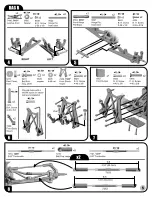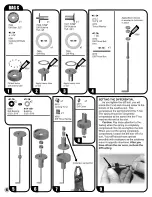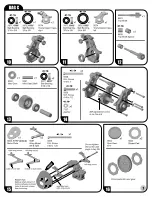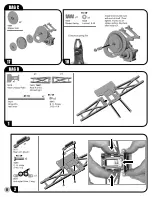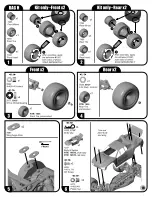
Testing camber with the
camber gauge
Raise or lower
the ball end by
adding or
subtracting
washers here
STEERING BLOCKS
The included trailing steering blocks (#9581)
should be used in most cases. The Team es-
pecially recommends the trailing blocks on high-
grip or “blue-groove”.
Changing to the optional inline steering
blocks (#9577) and axles (#7459) will give the
car an overall aggressive feeling. Steering en-
tering and exiting the corners is increased, but
straight line stability is reduced.
TUNING & SETUP TIPS
These steps prepare your buggy for maximum performance
CASTER
Caster describes the angle of the kingpin as it
leans toward the rear of the vehicle. Positive
caster means the kingpin learns rearward at the
top.
The supplied 25° caster blocks (#9580) are
recommended in most cases. For more corner
entry steering and less exit steering, try the
optional 30° blocks (#9593).
The optional 20° blocks (#9592) will give
you more exit steering and less entry steering.
FRONT CAMBER LINKS
Changing the length of the camber link is
considered a bigger step than adjusting the
ball end height on the tower. Shortening the
camber link (or lowering the ball end) will give
the front end less roll and quicken steering
response. Lengthening the camber link (or
raising the ball end) will give the front more
roll and slower steering response.
Longer camber links are typically used
on high grip tracks and shorter links tend to
work better on medium-grip loose tracks.
Raise or lower the ball
end by adding or subtract-
ing washers here
CAMBER
Camber describes the angle at which the tire
and wheel rides when looked at from the front.
Negative camber means that the tire leans in-
ward at the top.
A good starting camber setting is –1°. Use
the included #1719 camber gauge to set your
camber as shown. Positive camber, where the
top of the tire is leaning out, is not recom-
mended.
FRONT TOE-IN
Toe-in describes the angle of the front tires
when viewed from the top. With toe-in, the front
of the tires point inward.
Zero degree toe-in (tires pointing straight
forward) is the setting that should be used in
almost all track conditions. Occasionally you
can increase turn in by adding a little toe-out
(front of tires point slightly out). Front toe-in is
not a typical tuning adjustment used by the
Team.
FRONT RIDE HEIGHT
Ride height is the distance from the ground to
the bottom of the chassis.
The standard front ride height setting is
with the front arms level (referred to as “arms
level”). Check the ride height by lifting up the
entire car about 8-12 inches off the bench and
drop it. After the suspension “settles” into place,
add or remove pre-load clips so that the left &
right arms appear to be flat as seen in the fol-
lowing picture.
ANTI-SQUAT
Anti-squat denotes the angle of the rear arms
relative to the ground. Zero anti-squat means
that the rear arms are flat, parallel with the
ground. The kit setting is 2°, and can be ad-
justed by installing or removing the included
REAR CAMBER LINK
Changing the length of the camber link is con-
sidered a bigger step than adjusting the ball
end height on the rear chassis brace. Shorten-
ing the camber link (or lowering the ball end)
will give the rear end less roll and the car will
tend to accelerate or “square up” better. Length-
ening the camber link (or raising the ball end)
will give the rear more roll and more cornering
grip. Longer camber links are typically used on
high grip tracks, while shorter links tend to work
better on med-grip loose tracks. The kit setting
is the best compromise of cornering grip and
acceleration.
Upper shim (with one tab),
1°
Lower shim (with two tabs),
2°
shims underneath the arm mount.
The shim with 2 tabs is for 2° and the shim
with 1 tab is for 1°. You can use any combina-
tion of shims to get 0, 1, 2, or 3° anti-squat.
Adding anti-squat tends to make the car “ro-
tate” more in corners, but doesn’t handle as
well through the bumps.
REAR CAMBER
Camber describes the angle at which the tire
and wheel rides when looked at from the back.
Negative camber means that the tire leans in-
ward at the top.
A good starting camber setting is –1°. Use
the included #1719 camber gauge to set your
camber (shown above). Adding a small amount
of positive camber, where the top of the tire is
leaning out, will tend to improve straight-line
acceleration on loose tracks.
21
Front arms should be in a
straight line when ride height
is set as “arms level”

